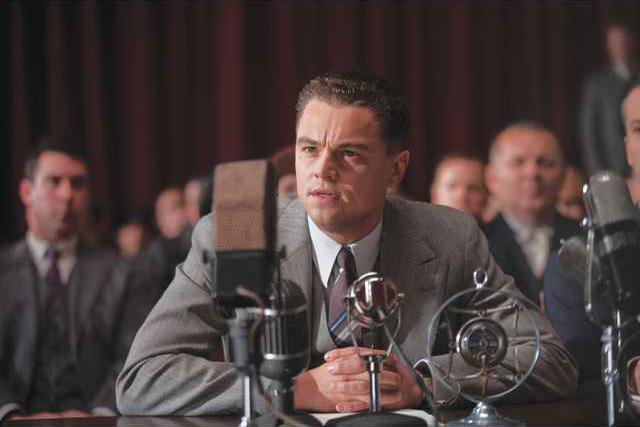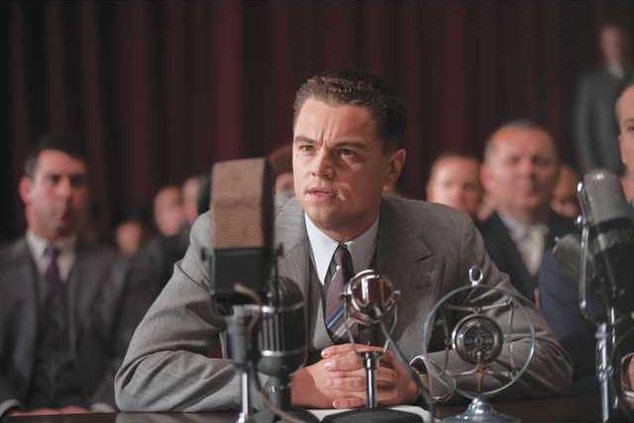'J. Edgar'
Starring: Leonardo DiCaprio, Naomi Watts, Josh Lucas, Judi Dench, Armie Hammer
Rated: R, for brief strong language
Runtime: 2 hours, 17 minutes
Bottom line: Wimpy biopic
Two things are wrong with "J. Edgar." The first problem is J. Edgar Hoover. The second problem is that the movie is about him.
Clint Eastwood's latest directorial effort is deftly made and features stellar performances by all involved. Like all biopics, the film's goal is to reveal the forces that molded an important public figure.
But in this case, that public figure is a self-loathing fascist who threatened American values as much as he protected them.
A film about Hoover might be fascinating, especially right now, when the debate over whether dissent is patriotic or treasonous is as important as ever. We frequently encounter the treacherous use of terms like "un-American" in our daily lives, and the subject of "J. Edgar" defined that term for half a century.
Yet screenwriter Dustin Lance Black and Eastwood shy away from that discussion, almost omitting it entirely. From a political and historical perspective, that is an irresponsible choice. From an artistic perspective, it is unforgiveable because the artists ignored what is most compelling about their subject.
What irked me most about "J. Edgar" is that it tries so darned hard to make me sympathize with Hoover, while it barely scratches the surface of the FBI director's offenses to liberty and human decency.
This is an extremely gentle treatment of a man who was anything but. If the treatment had been more even-handed, my response would be quite different.
The film's analysis of Hoover is patently Freudian. According to "J. Edgar," the dominant influence on Hoover (Leonardo DiCaprio) was his mother. Annie Hoover (Judi Dench) convinces her son that the only goals worthy of pursuit are greatness and power. She speaks to him like a queen preparing her prince to one day rule the land.
This makes Hoover just a tad ambitious and perfectionist, as you can imagine.
Annie is also primarily responsible for making her son extremely sexually repressed. Hoover displays hints of homosexuality throughout his life, but it isn't until he is a middle-aged man that he confesses to his mother that he prefers the company of men. Mother responds that she'd rather have a dead son than a gay son.
In a different movie, this character could have become Norman Bates (one scene is eerily similar, in fact). Hoover instead becomes a paranoid, closeted gay power-monger.
Hoover has exactly two other people in his life whom he trusts, his personal assistant Helen Gandy (Naomi Watts) and Associate Director of the FBI Clyde Tolson (Armie Hammer). Both are completely devoted and loyal to their boss, and in both cases, it's difficult to understand why.
The movie focuses most of its energies on Hoover's relationship with Tolson. It's the best part of the film, and we feel a great deal of affection for Tolson, whose only fault seems to be that he fell in love with the wrong man.
But the movie suffers from numerous sins of omission.
Hoover undermined the American principles of privacy and due process by gathering and disseminating information illegally, particularly during the post-World War II anti-communist era.
The movie largely skips over that period. "J. Edgar" shows Hoover building the FBI during the 30s by fighting Communists and Anarchists, then by investigating the Charles Lindberg (Josh Lucas) kidnapping.
Otherwise, the film is about Hoover's relationships with Tolson and his mother.
DiCaprio, Hammer, Dench and Watts deserve all the credit for making this movie watchable at all. Their strong performances are the only reason to care. DiCaprio may even earn awards for bringing intensity to what is otherwise a feeble movie.
Hoover died with plenty of blood on his hands, both literally and figuratively, but Eastwood chooses to gloss over that side of the man.
Of all the fascinating figures of the past century, I see very little reason to expend time on a film about Hoover, especially if the depiction shies away from his full complexity.
Jeff Marker is a media studies professor at Gainesville State College.

